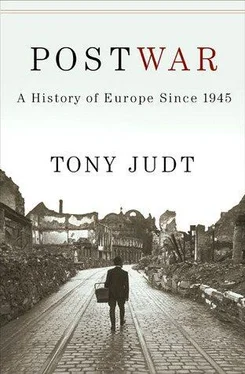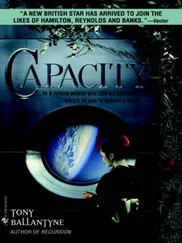Reid, T. R. The United States of Europe: The New Superpower and the End of American Supremacy . New York: The Penguin Press, 2004.
Shore, Cris. Building Europe: The Cultural Politics of European Integration . New York: Routledge, 2000.
Slaughter, Anne-Marie. A New World Order . Princeton: Princeton University Press, 2004.
Epilogue: From the House of the Dead
Bartov, Omer, Atina Grossmann, and Mary Nolan. Crimes of War: Guilt and Denial in the Twentieth Century . New York: New Press, 2002.
Bauer, Yehuda, and Nathan Rotenstreich. The Holocaust as Historical Experience . New York: Holmes & Meier, 1981.
Bloxham, Donald. Genocide on Trial: War Crimes Trials and the Formation of Holocaust History and Memory . New York: Oxford University Press, 2001.
Borkowicz, Jacek, et al. Thou Shalt Not Kill: Poles on Jedwabne . Warsaw: Wiez, 2001.
Braham, Randolph L. The Politics of Genocide: The Holocaust in Hungary . New York: Columbia University Press, 1981.
Brenner, Michael. After the Holocaust: Rebuilding Jewish Lives in Postwar Germany . Princeton: Princeton University Press, 1997.
Caracciolo, Nicola, Florette Rechnitz Koffler, and Richard Koffler. Uncertain Refuge: Italy and the Jews During the Holocaust . Urbana: University of Illinois Press, 1995.
Colijn, G. Jan, and Marcia Sachs Littell. The Netherlands and Nazi Genocide: Papers of the Twenty-First Annual Scholars’ Conference . Lewiston, NY: E. Mellen Press, 1992.
Douglas, Lawrence. The Memory of Judgment: Making Law and History in the Trials of the Holocaust . New Haven: Yale University Press, 2001.
Evans, Richard J. In Hitler’s Shadow: West German Historians and the Attempt to Escape from the Nazi Past . New York: Pantheon Books, 1989.
Golsan, Richard. The Papon Affair: Memory and Justice on Trial . New York: Routledge, 2000.
Grodzinsky, Yosef. In the Shadow of the Holocaust: The Struggle Between Jews and Zionists in the Aftermath of World War II . Monroe, ME: Common Courage Press, 2004.
Gross, Jan. Neighbors: The Destruction of the Jewish Community in Jedwabne, Poland . Princeton: Princeton University Press, 2001.
Hass, Aaron. The Aftermath: Living with the Holocaust . New York: Cambridge University Press, 1995.
Herf, Jeffrey. Divided Memory: The Nazi Past in the Two Germanys . Cambridge, MA: Harvard University Press, 1997.
Hirschfeld, Gerhard. Nazi Rule and Dutch Collaboration: The Netherlands under German Occupation, 1940-1945 . New York: Berg, 1988.
Hockenos, Matthew D. A Church Divided: German Protestants Confront the Nazi Past . Bloomington: Indiana University Press, 2004.
Huyssen, Andreas. Twilight Memories: Marking Time in a Culture of Amnesia . New York: Routledge, 1995.
Joerges, Christian, and Navraj Singh Ghaleigh. Darker Legacies of Law in Europe: The Shadow of National Socialism and Fascism over Europe and its Legal Traditions . Portland, OR: Hart Publishers, 2003.
Kushner, Tony. The Holocaust and the Liberal Imagination: A Social and Cultural History . Oxford: Blackwell, 1994.
LaCapra, Dominick. History and Memory after Auschwitz . Ithaca, NY: Cornell University Press, 1998.
Levi, Primo. The Drowned and the Saved . New York: Vintage Books, 1989.
———. Survival in Auschwitz . New York: Collier Books, 1993.
Maier, Charles S. The Unmasterable Past: History, Holocaust, and German National Identity. Cambridge, MA: Harvard University Press, 2003.
Mankowitz, Zeev W. Life Between Memory and Hope: The Survivors of the Holocaust in Occupied Germany . New York: Cambridge University Press, 2002.
Marrus, Michael Robert. The Holocaust in History . New York: New American Library, 1989.
Marrus, Michael Robert, and Robert O. Paxton. Vichy France and the Jews . Stanford, CA: Stanford University Press, 1995.
Mikhman, Dan. Remembering the Holocaust in Germany, 1945-2000: German Strategies and Jewish Responses . New York: P. Lang, 2002.
Mitscherlich, Alexander. The Inability to Mourn: Principles of Collective Behavior . New York: Grove Press, 1984.
Mitten, Richard. The Politics of Anti-Semitic Prejudice: The Waldheim Phenomenon in Austria . Boulder, CO: Westview Press, 1992.
Moore, Bob. Victims and Survivors: The Nazi Persecution of the Jews in the Netherlands, 1940-1945 . New York: Arnold, 1997.
Müller, Jan-Werner. Memory and Power in Post-War Europe: Studies in the Presence of the Past . Cambridge: Cambridge University Press, 2002.
Nossiter, Adam. The Algeria Hotel: France, Memory, and the Second World War . Boston: Houghton Mifflin, 2001.
Polonsky, Antony. “My Brother’s Keeper?” Recent Polish Debates on the Holocaust . New York: Routledge, 1990.
Presser, J. Ashes in the Wind: The Destruction of Dutch Jewry . London: Souvenir Press, 1968.
Rousso, Henry. The Vichy Syndrome: History and Memory in France since 1944 . Cambridge, MA: Harvard University Press, 1991.
Todorov, Tzvetan. Hope and Memory: Lessons from the Twentieth Century . Princeton: Princeton University Press, 2003.
Utgaard, Peter. Remembering and Forgetting Nazism: Education, National Identity, and the Victim Myth in Postwar Austria . New York: Berghahn Books, 2003.
In the chapters that follow the footnotes are, for the most part, of the traditional sort: that is, they comment on the text rather than identify a source. To avoid adding to what is already a very long book addressed to a general readership, a full apparatus of references is not provided here. Instead, the sources for Postwar , together with a full bibliography, will in due course be available for consultation on the Remarque Institute website http://www.nyu.edu/pages/remarque/ .
Or by Stalin, who ordered the shooting of 23,000 Polish officers in Katyn forest in 1940 and then blamed it on the Germans.
By way of comparison—the average daily calorie consumption in France in 1990 was 3,618.
They had good grounds for fear. The British army in Austria would later hand them over to the Yugoslav authorities (under an Allied agreement to return such prisoners to the government against whom they had fought) and at least 40,000 of them were killed.
Yet they, too, had little real choice—during the Depression years anyone who refused a proffered work contract from Germany risked losing his Dutch unemployment benefits.
In a speech in Bratislava on May 9th 1945, Benes declared that Czechs and Slovaks no longer wished to live in the same state as Hungarians and Germans. This sentiment, and the actions that followed, has haunted Czech-German and Slovak-Hungarian relations ever since.
With the significant exception of Greeks and Turks, following the Lausanne Treaty of 1923.
At the end of May 1945 the British Army turned over to Yugoslav authorities 10,000 Slovenian soldiers and civilians who had fled to Austria. Most of them were trucked south to the Kocevje forests and summarily shot.
The Halychnya or Galician Division of the Waffen SS was made up of Ukrainians who had been citizens of inter-war Poland and whose region of origin was incorporated into the USSR after the war. They were thus not repatriated to the Soviet Union, despite having fought against it alongside the Wehrmacht, and were treated by Western authorities as stateless persons.
Читать дальше












